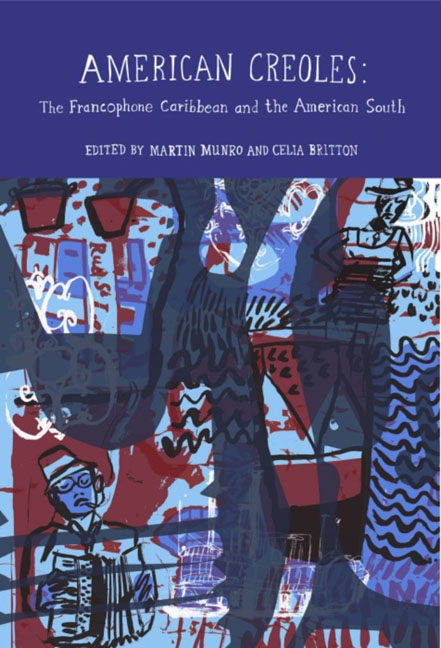Book contents
- Frontmatter
- Contents
- List of Illustrations
- Acknowledgements
- Introduction
- Creolizations
- Music
- Intertextualities: Faulkner, Glissant, Condé
- Go Slow Now: Saying the Unsayable in édouard Glissant's Reading of Faulkner
- Édouard Glissant and the Test of Faulkner's Modernism
- The Theme of the Ancestral Crime in the Novels of Faulkner, Glissant, and Condé
- An American Story
- Notes on Contributors
- Index
Édouard Glissant and the Test of Faulkner's Modernism
from Intertextualities: Faulkner, Glissant, Condé
- Frontmatter
- Contents
- List of Illustrations
- Acknowledgements
- Introduction
- Creolizations
- Music
- Intertextualities: Faulkner, Glissant, Condé
- Go Slow Now: Saying the Unsayable in édouard Glissant's Reading of Faulkner
- Édouard Glissant and the Test of Faulkner's Modernism
- The Theme of the Ancestral Crime in the Novels of Faulkner, Glissant, and Condé
- An American Story
- Notes on Contributors
- Index
Summary
Only for the sake of the hopeless ones have we been given hope.
Walter Benjamin, Selected Writings, Vol. 1, 1913–1926 (1996), pp. 335–56Et qu'on devrait, qu'on pourrait, à nouveau mais totalement, commencer – d'une autre sorte d'humanité
Édouard Glissant, Faulkner, Mississippi (1996), p. 299[And that we should, we could, begin again – completely, totally – a new type of humanity (Glissant, 2000: 218)]
Les paysages faulknériens s'altèrent d'une mauve fragrance, d'une puissance de mélancolie qui font que vous avez envie […] d'en revenir à peindre votre propre paysage, proche ou lointain.
Édouard Glissant, Faulkner, Mississippi (1996), p. 148[Faulkner's landscapes are suffused with a fragrance of mauve, with a power of melancholy that makes you feel like painting your own countryside, whether near or far (Glissant, 2000: 106)]
In Faulkner, Mississippi, Glissant provides us with an innovative reading of an author whose work we thought we already knew almost inside out. Indeed, in 1996, compared with other great modernists such as Joyce, Woolf, Proust, Kafka and Musil, Faulkner was beginning to seem outdated, ‘unsaleable’ and even undesirable within the field of literary criticism. Faulkner's heyday was under New Criticism and at the time of the White House's anti-communist policies of the 1950s and 1960s (Schwartz, 1988), and only a small number of brilliant hardliners such as Philip Weinstein, Barbara Ladd, John Mathews, Richard Godden, André Bleikasten and Claude Romano, along with a few others, have continued to explore his work and open it up to the new critical trends of the 1990s (see in particular Mathews, 2004; Ladd, 2003; 2007; Loichot, 2003; Romano, 2005; Bleikasten, 2007; Weinstein, 1996; 2006; Chrétien, 2009). Despite these endeavours, Faulkner has not survived the theoretical turns of these last decades well. It would be too easy to explain this by pointing to the latent and atavistic racism of this ‘white Southerner’, along with the complexity and apparent decline of his style (the difficulty of the books which preceded Go Down Moses (1942) was considered to be an indisputable mark of quality by pro-modernist formalists, whereas the ratiocinations of his final novels betrayed, in their view, a delirious and paternalistic humanism).
- Type
- Chapter
- Information
- American CreolesThe Francophone Caribbean and the American South, pp. 197 - 215Publisher: Liverpool University PressPrint publication year: 2012



